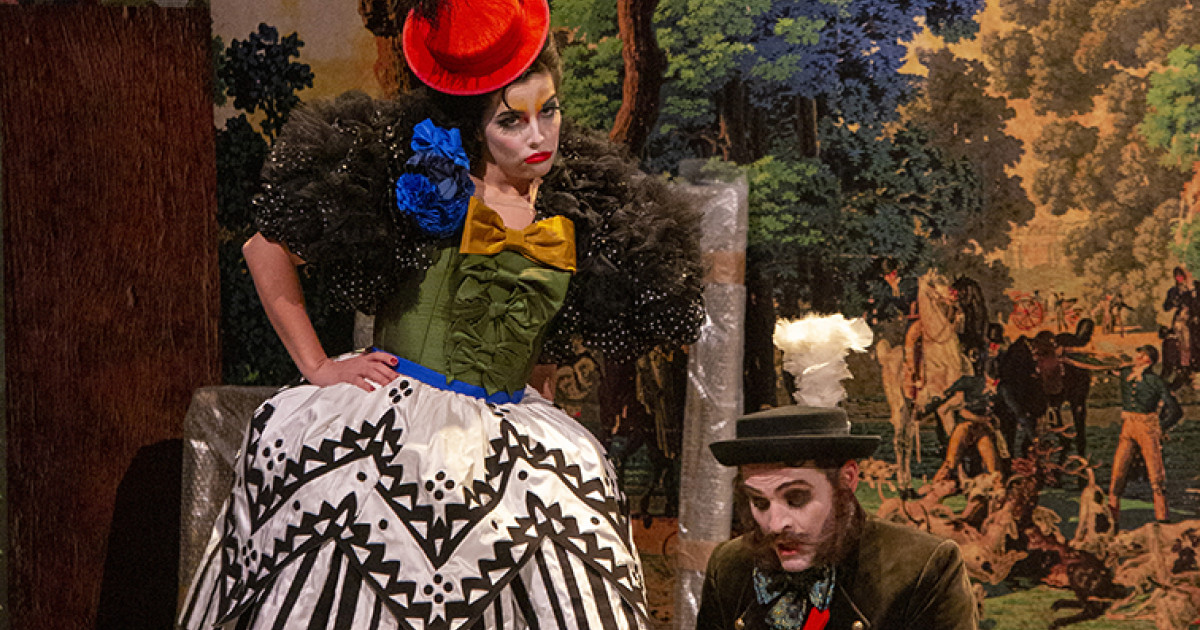La vie parisienne (Offenbach) Paris 2021 Aude Extrémo, Sandrine Buendia, Franck Leguérinel, Jodie Devos
In this video
La vie parisienne by Jacques Offenbach
Théâtre des Champs-Élysées, Paris, France
December 27, 2021
CAST
Jodie Devos — Gabrielle
Rodolphe Briand — Gardefeu
Marc Mauillon — Bobinet
Franck Leguérinel — The Baron of Gondremarck
Sandrine Buendia — The Baroness of Gondremarck
Aude Extrémo — Métella
Éric Huchet — The Brazilian / Gontran / Frick
Laurent Kubla — Urbain / Alfred
Carl Ghazarossian — Joseph / Alphonse / Prosper
Ingrid Perruche — Madame de Quimper-Karadec
Caroline Meng — Madame de Folle-Verdure
Elena Galitskaya — Pauline
Louise Pingeot — Clara
Marie Kalinine — Bertha
_____________________________________________________________
Romain Dumas — Conductor
Les Musiciens du Louvre — Orchestra
Namur Chamber Choir — Chorus
Le Jeune Orchestre Atlantique — Orchestra
_____________________________________________________________
Christian Lacroix — Stage director, set and costume design
Laurent Delvert — Co-stage director
Romain Gilbert — Co-stage director
Glyslein Lefever — Choreographer
Bertrand Couderc — Lighting designer
=============================================================
La Vie parisienne (French pronunciation: [la vi paʁizjɛn], Parisian life) is an opéra bouffe, or operetta, composed by Jacques Offenbach, with a libretto by Henri Meilhac and Ludovic Halévy.
This work was Offenbach’s first full-length piece to portray contemporary Parisian life, unlike his earlier period pieces and mythological subjects. It became one of Offenbach’s most popular operettas.
In 1864 the Théâtre du Palais-Royal presented a comedy by Meilhac and Halévy entitled Le Photographe (The Photographer), which featured a character called Raoul Gardefeu, the lover of Métella, trying to seduce a baroness. Two years earlier, a comedy by the same authors La Clé de Métella (The Key of Métella) was played at the Théâtre du Vaudeville. These two pieces presage the libretto of La vie parisienne which can be dated from late 1865.
Synopsis
Act 1
The story begins at the Gare de l’Ouest, where the employees list the provenance of trains arriving from different places in France (“Nous sommes employés de la ligne de l’Ouest”). Two Parisian dandies, Bobinet and Gardefeu are waiting for the train from Rambouillet, but avoid each other while they walk around. They have fallen out over the demi-mondaine Métella. She arrives with a third man and pretends not to recognize the two previous lovers. Her rejection reunites the two friends and they vow to seek a better class of mistress (“Elles sont tristes, les marquises”). While wondering how he will achieve this Gardefeu sees his former servant Joseph, now a tourist guide. Joseph reveals that he is to meet a Swedish baron and his wife who he is to show around Paris but for a sum agrees to let Gardefeu take his place. While he goes to look for the baron, Gardefeu wonders what will happen with the baroness (“Ce que c’est pourtant que la vie !”) The Baron and Baroness Gondremarck enter and he promises to show them everything they want to see in the French capital (“Jamais, foi de cicérone”). The station fills with more passengers arriving for a good time in Paris, including a Brazilian returning after having spent his fortune once before in the city (“Je suis Brésilien, j’ai de l’or”).
Act 2
At Gardefeu’s home, his glove-maker Gabrielle and his boot-maker Frick await the master’s return (“Entrez ! entrez, jeune fille à l’œil bleu !”). Gardefeu continues his pretence with the Swedes, explaining that they are in an annexe to the hotel, hoping to get the baron out of the way so that he can pay attention to the baroness; the baron already has his plans based on a letter from a friend (“Dans cette ville toute pleine”). The baron then asks to take the table d’hôte. The problem of missing hotel guests is solved by getting Gabrielle and Frick and their friends to impersonate other hotel guests. Bobinet calls by and offers to stage a party for the Swedes at his absent aunt’s mansion the following night, with the baron invited. The baroness finds remnants of Gardefeu’s affair with Métella in her room. Métella herself now arrives hoping for a reconciliation with Gardefeu (“Vous souvient-il, ma belle”) and ends with offering to entertain the baron in a few days. The guests arrive for the table d’hôte; Frick as a major (“Pour découper adroitement”) and Gabrielle as a war widow (“Je suis veuve d’un colonel”) and with a tyrolienne everyone retires to supper (“On est v’nu m’inviter”).
Act 3
At a party the next evening hosted by Bobinet his servants dress up as the crowd of aristocrats (“Donc, je puis me fier à vous !”). Baron Gondremarck arrives and is taken by Pauline ‘Madame l’amirale’ (in fact a chambermaid). Gabrielle arrives (“On va courir, on va sortir”) and Bobinet as a Swiss admiral (“Votre habit a craqué dans le dos !”).
Bobinet rises to greet the crowd with a drinking song (“En endossant mon uniforme”) and the champagne flows (“Soupons, soupons, c’est le moment”), the baron and everyone else gets drunk.
Act 4
The Brazilian millionaire is offering a masquerade ball at the Café Anglais. The head waiter tells his staff to be discreet during about the guests (“Avant toute chose, il faut être… Fermez les yeux”). The baron arrives for his assignation with Métella, while growing increasingly suspicious of the goings-on. Métella tells the baron to be patient (“C’est ici l’endroit redouté des mères”) but she will not be his entertainment: she is in love with someone else but has brought a friend for him. The baron is furious when he discovers that her lover is Gardefeu. The Brazilian arrives, then Bobinet and Gardefeu. After showing Métella the letter (“Vous souvient-il, ma belle”) she and Gardefeu are reconciled, and the baron’s fury only stops when baroness intervenes. All toast Paris (“Par nos chansons et par nos cris, célébrons Paris.”).
Quoted from Wikipedia

















